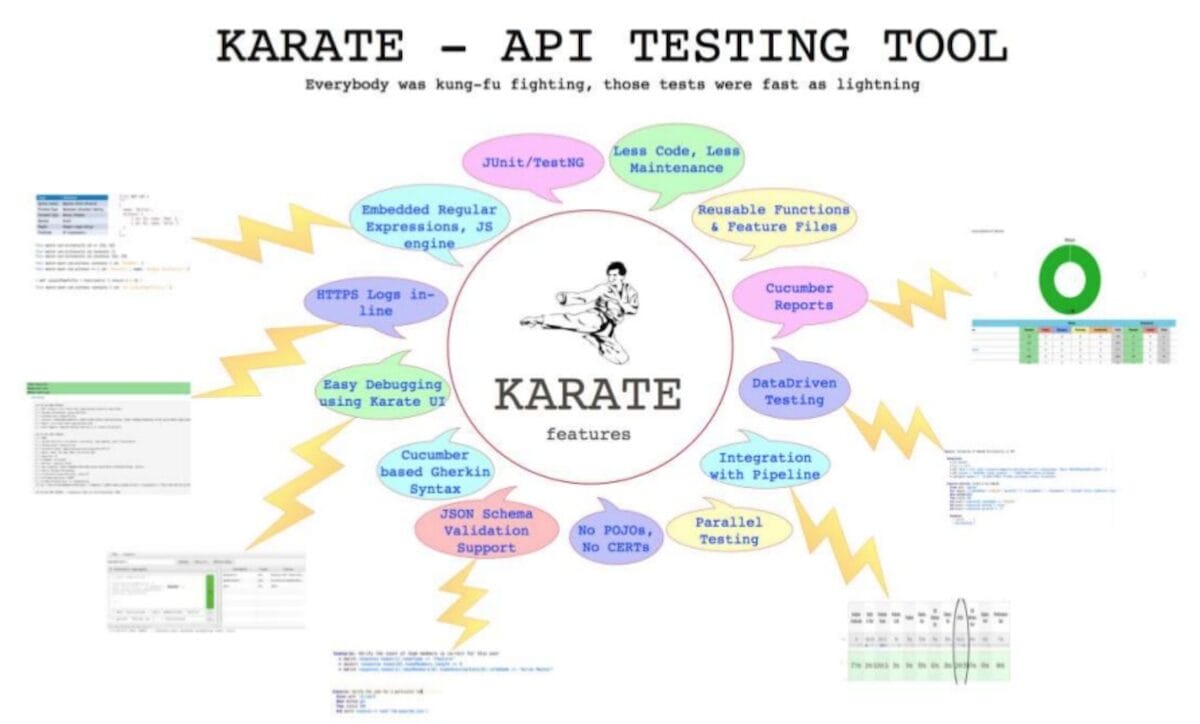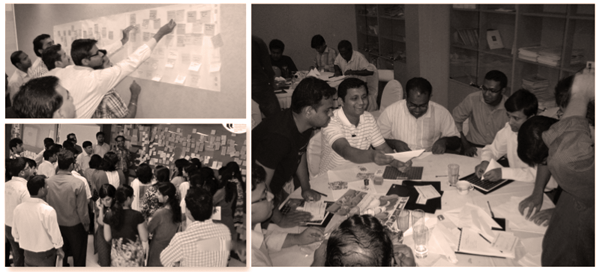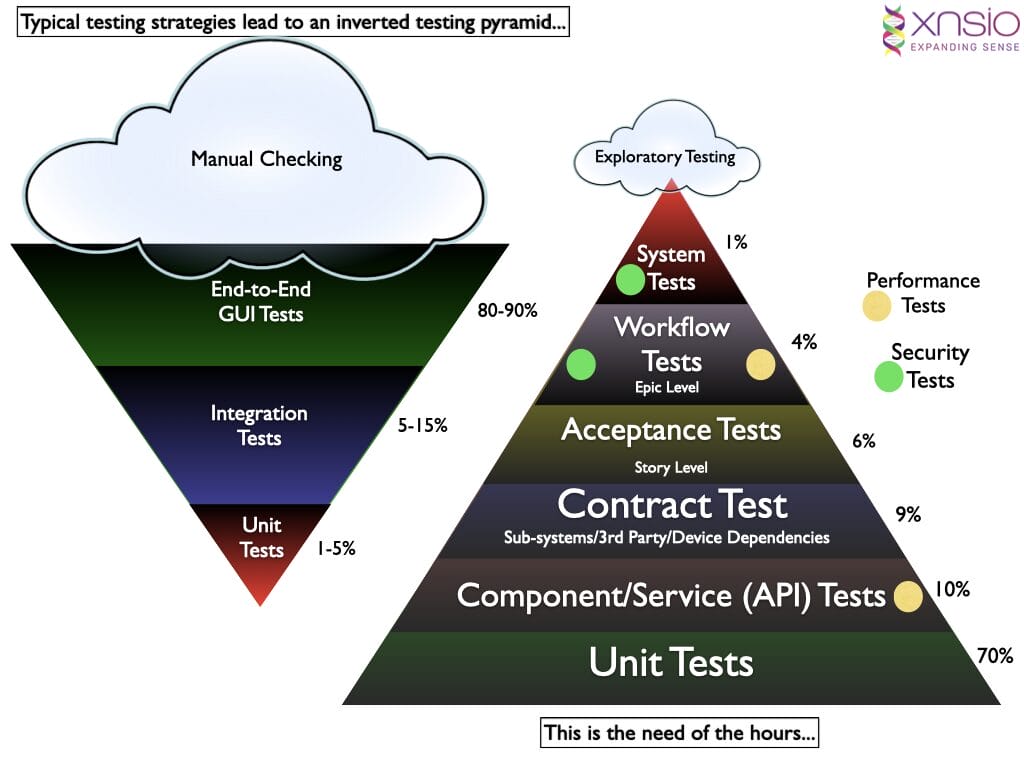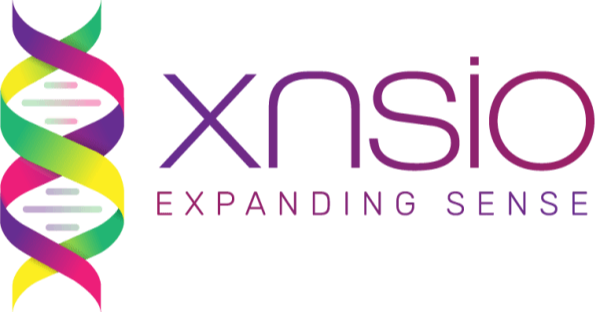Module 1 – Test pyramid
Building a Scalable API Testing Framework
Foundation & Deep Dive into API Testing
Key takeaways and practical knowledge

At the end of this workshop the team will be able to:
Automating API Tests Using Karate
- Test Exercise
- Understand the need of testing at API Layer
- Understanding the test pyramid
- Types of tests
- Roles
- Where to test what layer?
- Understand What, Why and How of Web Services
- Types of Web Services
- Structure of a API
- Introduction to SOAP & RESTful services
- REST vs SOAP
- Resources methods/verbs
- Automation Exercise
- GET
- GET with Path Parameters
- GET with Query Parameters
- POST
- API Authentication and Authorization
- Setting headers with auth tokens
- JSON Body
- Debugging
- Automation Exercise: Build Workflow using GET / POST
- Extracting values from responses and using in subsequent calls
- PUT & DELETE – Explain the API, examples of usage
- Automate & validate
- Exercise: Extend/build new workflow using combination of above
- Request headers
- Response headers
- Response validations with Karate
- Understanding JSON and writing JsonPaths
- Assertions
- Schema validations
- CSV files
- YAML files
- Data Tables
- Add tags in tests
- Run specific tests based on tags
- Criteria for parallel test execution
- Configuring tests for parallel execution
- Reuse the feature files
- How to specify parameters
- Different ways to get return values from called scenario
- Calling scenarios in loop
- Call java/js scripts in the feature files
- Default reporters
- Custom reporters
- Build end-to-end workflow tests based on above learning
- Test Exercise
- Understand the need of testing at API Layer
- Understanding the test pyramid
- Types of tests
- Roles
- Where to test what layer?
- Understand What, Why and How of Web Services
- Types of Web Services
- Structure of a API
- Introduction to SOAP & RESTful services
- REST vs SOAP
- Intro to BDD – Feature files
- Introduction to Karate
- Setup karate using Maven/Gradle
- Configuring Karate
- Running the Karate tests and seeing results in default reporter & karate.log
- Resources methods/verbs
- Automation Exercise
- GET
- GET with Path Parameters
- GET with Query Parameters
- POST
- API Authentication and Authorization
- Setting headers with auth tokens
- JSON Body
- Debugging
- Automation Exercise: Build Workflow using GET / POST
- Extracting values from responses and using in subsequent calls
- PUT & DELETE – Explain the API, examples of usage
- Automate & validate
- Exercise: Extend/build new workflow using combination of above
Module 1 – Test pyramid
Module 2 – Introduction to Web Services
Module 4 – Automate API tests using Karate
Assignment 1
Module 5 – Automate API tests using Karate
Schema validations
Module 7 – Test categorization
Module 8 – Parallel execution
Module 9 – Scaling your implementation
Module 10 – Custom functions
Module 11 – Reporting
Assignment 2
Module 1 – Test pyramid
Module 2 – Introduction to Web Services
Module 3 – Introduction to Karate
Module 4 – Automate API tests using Karate
Assignment 1
Benefits
All of our courses offer following benefits:
- Unlimited access to course materials, sample projects and code examples with relevant tools
- Low participant-to-instructor ratio
- Heavy focus on hands-on learning experience
- Live demos and real-world examples
- Interactive activities/simulations to help understand the essence and concepts
- Open discussion and dynamic format
- Customizable
Post training, if your team needs help, we’ll be happy to assist your team.

End-to-end functional tests driven from the GUI are typically too slow, fragile and complex. Since API tests do not rely on GUI to be ready, they can be created early in the software development process, often before the GUI is created, allowing us to find potential bugs faster and hence shift testing left. Also, API testing allows us to make requests that might not be allowed through the GUI, which is crucial for exposing potential security flaws in an application.
While some end-to-end functional GUI tests will be needed to verify if UI elements appear correctly and can be interacted with, API tests are much faster and more reliable. API tests will allow you to rapidly set up server state and run series of API validations very efficiently, allowing you to focus on testing your core business logic along with database transactions and other microservice integration.
In this workshop, we will learn how to automate tests for RESTful APIs and build components essential for a comprehensive and scalable API testing framework.
Agenda
- Getting started (4 hours)
- Module 1 – Test pyramid
- Module 2 – Introduction to Web Services
- Module 3 – Introduction to Karate
- Module 4 – Automate API tests using Karate
- Assignment 1
- Deep-dive (4 hours)
- Module 5 – Automate API tests using Karate
- Module 6 – Data Driven tests
- Module 7 – Test categorization
- Module 8 – Parallel execution
- Module 9 – Scaling your implementation
- Module 10 – Custom functions
- Module 11 – Reporting
- Assignment 2

Learning Outcome
At the end of this workshop the team will be able to:
- Understand the importance of the Test pyramid and where API tests fit
- Learn the fundamentals of API testing (at individual API and Workflow level)
- Understand how REST requests work so you can effectively test them
- Implement request set up and assertions to test REST services with Karate and Postman
- Learn how to analyse Karate reports and logs

Course Outline
Getting Started (4 hours)
Module 1 – Test pyramid
- Test Exercise
- Understand the need of testing at API Layer
- Understanding the test pyramid
- Types of tests
- Roles
- Where to test what layer?
Module 2 – Introduction to Web Services
- Understand What, Why and How of Web Services
- Types of Web Services
- Structure of a API
- Introduction to SOAP & RESTful services
- REST vs SOAP
Module 3 – Introduction to Karate
- Intro to BDD – Feature files
- Introduction to Karate
- Setup karate using Maven/Gradle
- Configuring Karate
- Running the Karate tests and seeing results in default reporter & karate.log
Module 4 – Automate API tests using Karate
- Resources methods/verbs
- Automation Exercise
- GET
- GET with Path Parameters
- GET with Query Parameters
- POST
- API Authentication and Authorization
- Setting headers with auth tokens
- JSON Body
- Debugging
- Automation Exercise: Build Workflow using GET / POST
- Extracting values from responses and using in subsequent calls
Assignment 1
- PUT & DELETE – Explain the API, examples of usage
- Automate & validate
- Exercise: Extend/build new workflow using combination of above
Deep Dive (4 hours)
Module 5 – Automate API tests using Karate
- Request headers
- Response headers
- Response validations with Karate
- Understanding JSON and writing JsonPaths
- Assertions
- Schema validations
Module 6 – Data Driven tests
- CSV files
- YAML files
- Data Tables
Module 7 – Test categorization
- Add tags in tests
- Run specific tests based on tags
Module 8 – Parallel execution
- Criteria for parallel test execution
- Configuring tests for parallel execution
Module 9 – Scaling your implementation
- Reuse the feature files
- How to specify parameters
- Different ways to get return values from called scenario
- Calling scenarios in loop
- Reuse the feature files
Module 10 – Custom functions
- Call java/js scripts in the feature files
Module 11 – Reporting
- Default reporters
- Custom reporters
Assignment 2
- Build end-to-end workflow tests based on above learning
Instruction Method, Audience & Prerequisites
Method of Instruction
Transfer %
Target Audience
- Primary: Developers, QA, Automation Engineers/SDETs
- Secondary: Technical Managers, Business Analysts, Architects
Course Level
Course Prerequisites
- Required: Understanding of testing and automation in general
- Highly Recommended: basic understanding of the life-cycle of software projects
Want to enroll or customize a training for your team?
Contact us to get started.
Training Details
Pricing
- Trainer Fee: Rs. 1,70,000 (~2000 USD) per day
- GST: Additional 18% GST applicable on all trainings delivered in India
- Expenses: Travel, accommodation and other expenses to be paid by the company
- No. of Participants: All our training have a cap of max 20 participants per training
Contact Details
If you are interested in any of the trainings listed here or interested in customizing these trainings to your needs, please contact us.
Timings
9:00 AM – 6:00PM
These trainings can also be conducted on a weekend if that works better for your team.
General Requirements
Machine Setup Instructions
- Latest Java SDK (> 1.8)
- Set JAVA_HOME environment variable
- Install IDE (IntelliJ Idea Community Edition is preferred)
- Install and Setup Maven/Gradle
- Latest Postman
In-person Training Room Setup
- HDMI projector (1024x768 minimum) & Projector screen
- 1 White board & Dry erase markers
- Cluster seating with 5-6 people on each table
- 1 Flip chart with the stand and marker pens for each table
- Notepad and Pen for each participant
Training Details
Method of Instruction
Interactive Dialogues, Hands-on Exercises and Demos
Transfer %
Knowledge: 70%, Skill-Building: 30%
Target Audience
- Primary: Developers, QA, Automation Engineers/SDETs
- Secondary: Technical Managers, Business Analysts, Architects
Course Level
Beginner to Intermediate
Course Prerequisites
- Required: Understanding of testing and automation in general
- Highly Recommended: basic understanding of the life-cycle of software projects
General Requirements
Machine Setup Instructions
Participants should have the following setup ready on their machine:
- Latest Java SDK (> 1.8)
- Set JAVA_HOME environment variable
- Install IDE (IntelliJ Idea Community Edition is preferred)
- Install and Setup Maven/Gradle
- Latest Postman
In-person Training Room Setup
- HDMI projector (1024×768 minimum) & Projector screen
- 1 White board & Dry erase markers
- Cluster seating with 5-6 people on each table
- 1 Flip chart with the stand and marker pens for each table
- Notepad and Pen for each participant
Testimonials
“Inversion of Software Development”, that’s what Naresh gave me through his 5 days workshop at Amazon. He is one of the best mentors I encountered in my career.
The way he tries to explain TDD and Design principles with practical approaches, always challenging the concepts which we used to think were industry standards. Learning through his workshop, now coding is like blogging, drop dead simple, and you don’t look back.
I hope we had more dojos like Naresh mentoring people in Indian Software Industries to let them know what real clean software development is all about. To sum up he instilled the idea – “Perfection isn’t the goal, it’s the baseline.” about software development in me.

– Rajat Talwar, Software Engineer II, Amazon
It’s been 3 weeks since I had the opportunity to attend a 3-Day TDD workshop followed by a 3-Day Design Patterns workshop by Naresh Jain. Post the workshops; I was able to fully test drive a feature that is already in production.
I had many take-away from his workshops, but the most important ones were – 1. It gave me the confidence that with TDD you can come up with good designs, 2. Learnt refactoring techniques and IDE tricks, 3. Got a deeper understanding of design values, principles and patterns. 4. Identifying code smells (the codes that I was proud of, now all I see there is code smells :P). But thanks to Naresh I know how to make it right.

– Chandan Kumar, Software Development Engineer, Amazon
I recently met Naresh Jain during Test Driven Development(TDD) training at my current organisation. He is very knowledgeable and also very effective as a trainer. His enthusiasm and confidence is a game-changer when it comes to motivating the workshop participants.
I’ve really benefited from his training and by applying TDD in my day-to-day work . It was a great experience and I wish, I could get a chance to work with him on a real project.

– Lokesh Gaur, Technical Lead,Samsung Research
Rarely have I met a trainer who was truly hands-on. The depth of knowledge and on-field experience of Naresh Jain is truly inspiring. His proficiency in agile techniques and TDD is bleeding edge.
We have benefited immensely in barely three days of TDD training with him. We wish he was on our team here in EMC2.

– Vimal Kumar, Principal Software Engineer, EMC2
Recently I attended Naresh’s workshop on Test Driven Development (TDD) at Amazon, Hyderabad. It was a great learning experience and an eye-opener in few cases.
He is very involved with the Agile community and has worked with a lot of industry experts. That’s the best part of getting trained by him. He is up-to-date with the latest trends and his skills are very relevant.
Naresh’s in-depth knowledge and great attitude, fueled by his passion for technology makes him a great techie to work with. I had a great experience and would highly recommend him for training/coaching or even just to have good discussions.



